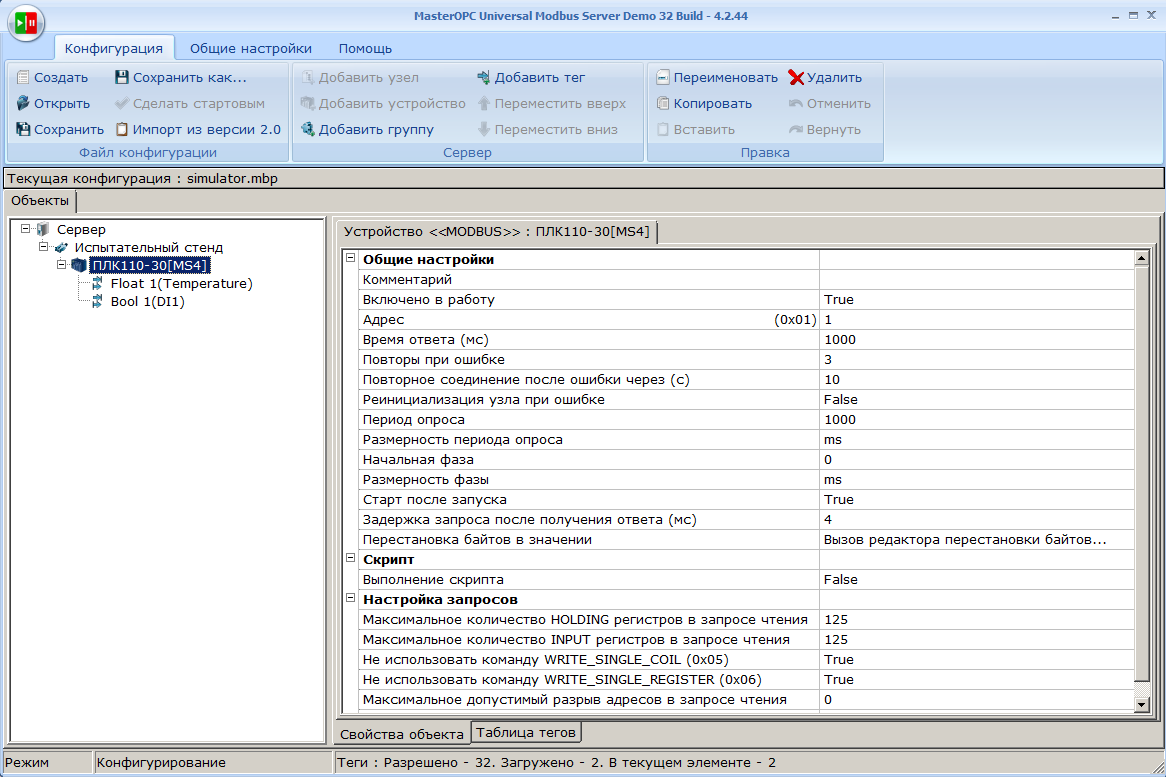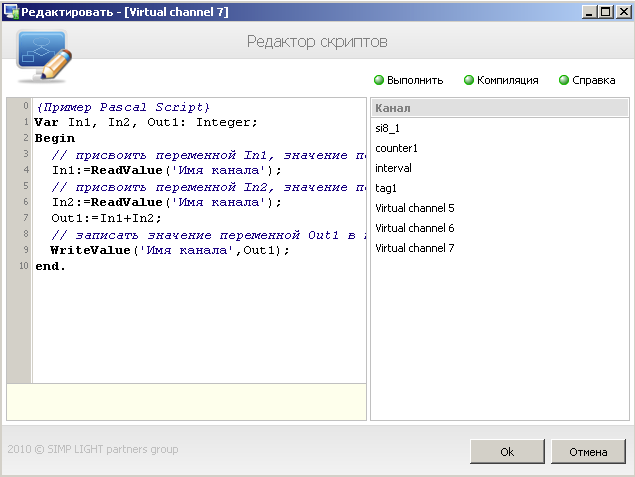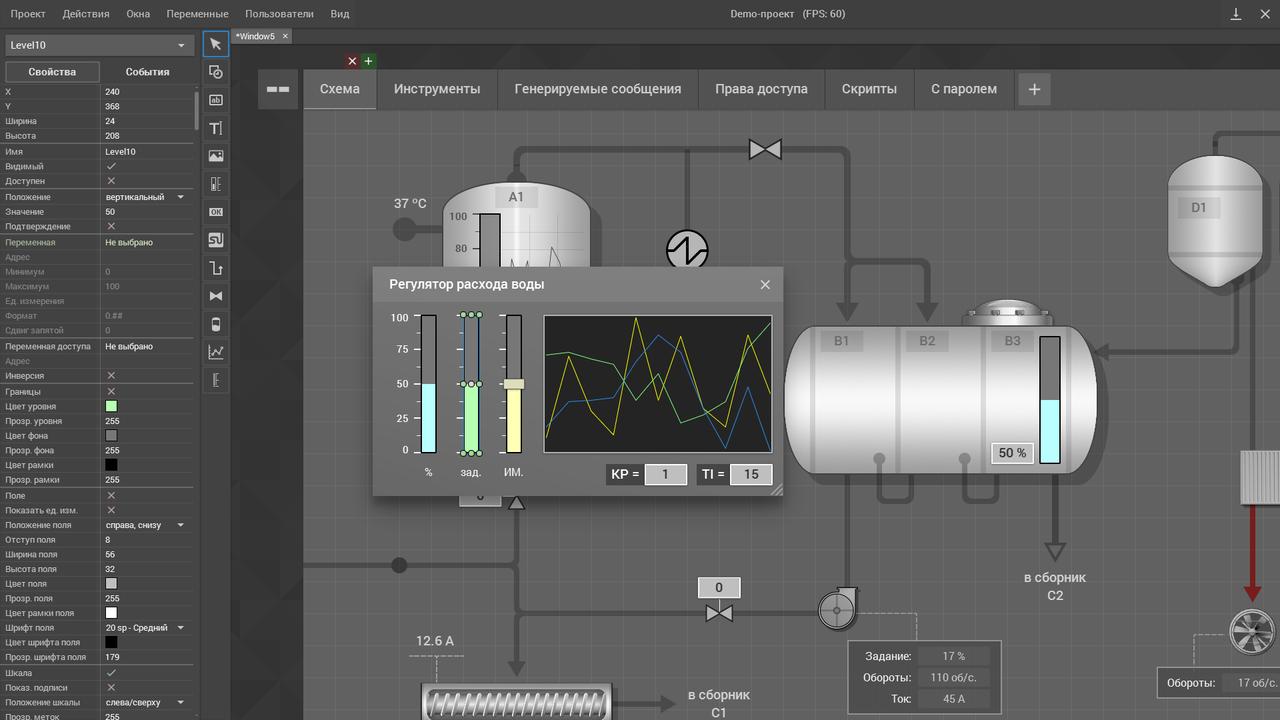ARIES PLC110 [M02] -MS4, HMI, OPC and SCADA, or how much a person needs Chamomile tea. Part 2
Good afternoon friends. The second part of the review is keeping pace with the first , and today I am writing a review to the upper level indicated in the title of the system.
The group of top-level tools includes all the firmware located above the PLC network (IDE for PLC, HMI, utilities for chastotnikov, modules, etc. we do not include here).
I will apply the structure of the system from the first part again, in order to make it easier to understand what it is about.

So, the upper level includes:
I will not touch the enterprise’s corporate network (CS), since it is the responsibility of our system administrator, but I’ll tell you how I interacted with it, what tasks I set when I will describe the implementation of the system, and not the overview.
First of all, we physically realize the iron that will work for us. Hardware, for functioning in two different networks, the computer requires two, in fact, network adapters. The first one I had was the on-motherboard adapter (for working in the CS), and the second (for working in Modbus-TCP) I inserted the PCI-E port and from it brought the patch cord to the router (just so as not to scatter the wires from the cabinets from the PLC to PC for the bureau. Of course, we also install a router from the PLC side.).
In fact, this is enough for the computer to function in each of the networks, but by default the networks will not see each other, you will still need to push the buttons.
Important aspects of setting up network connections:
I wanted to choose products that would meet certain criteria:
During my acquaintance with MasterSCADA 4D, while the PLC was being tested, I actively visited the manufacturer’s website and saw that they offer their own writing OPC servers for almost any data transfer protocol. For the Modbus protocol, they have a separate Master OPC Universal Modbus Server , i.e. he can speak only in Modbus.
Below is a screenshot of the interface: quite succinctly, in my opinion, there is nothing superfluous, but maybe a sophisticated user may lack something.

The limitation of the free version is 32 tags , but I put the boolean variables in the registers and sent it with one LONG INT tag, and in SCADA, I already “parsed” it into bits, a little trick, I hope they won’t come for me. By the way, not all skads can access individual bits of a word, so the recipe is not universal.
It took me about a minute to receive the first REAL type tag after installing OPC, so I didn’t look any further, I was comfortable with simplicity. However, it will be fair to say that this software even provides for the execution of user scripts for receiving data, which can significantly expand the functionality in skilled hands.
In this matter, I mean not only the creation of a beautiful and functional environment for the user, but also the convenience for the developer, since a programmer who flips through the documentation at least 15 minutes per hour to find the necessary information loses up to 2 hours a day (purely arithmetically), that is 25% of the working day. Please note that I do not consider my choice as absolutely objective, in taste and color, as they say ...
The domestic market of SCADA - systems offers us:
I admit, I did not look further, maybe there is something else. Considering that I made a choice, it means the operation was successful. Let's look at these systems, recalling the criteria described above:
Here the choice was much simpler, Simple SCADA offers two MS SQL Server and MySQL products for use. The second turned out to be closer to me, since I had previously worked with him, I stopped at this.
I can note that the whole archiving setup comes down to installing a package from Oracle and its simple configuration, and then connecting in one click to SCADA.
Then we select in the tag manager what to archive and what not to enjoy.
Thank you all for your attention.
Next is a series of articles with a consistent description of the solution to the problems that I encountered and, as a result, the creation of Step-by-Step system.
The group of top-level tools includes all the firmware located above the PLC network (IDE for PLC, HMI, utilities for chastotnikov, modules, etc. we do not include here).
I will apply the structure of the system from the first part again, in order to make it easier to understand what it is about.

So, the upper level includes:
- PC gateway routing traffic between two networks (PLC network and enterprise LAN)
- OPC server - software that collects data from the Modbus TCP network and interprets it for processing in SCADA and the database
- SCADA - A software package that includes a server and clients. Our graphical shell for monitoring and process control
- DBMS - software that allows us to archive data coming into SCADA and, if necessary, retrieve it to view graphs, logs, and reporting
I will not touch the enterprise’s corporate network (CS), since it is the responsibility of our system administrator, but I’ll tell you how I interacted with it, what tasks I set when I will describe the implementation of the system, and not the overview.
So, let's begin
First of all, we physically realize the iron that will work for us. Hardware, for functioning in two different networks, the computer requires two, in fact, network adapters. The first one I had was the on-motherboard adapter (for working in the CS), and the second (for working in Modbus-TCP) I inserted the PCI-E port and from it brought the patch cord to the router (just so as not to scatter the wires from the cabinets from the PLC to PC for the bureau. Of course, we also install a router from the PLC side.).
In fact, this is enough for the computer to function in each of the networks, but by default the networks will not see each other, you will still need to push the buttons.
Important aspects of setting up network connections:
- Connection to the CS should not be performed with the receipt of the address from the DHCP server; you need to register the adapter settings manually (the address should not be in the range of DHCP addresses) with the obligatory indication of the network gateway. In the future, this is very important when organizing remote access
- No need to try to make a network bridge between the adapters, all routing is performed when the corresponding Windows service is enabled
- If you want to have access to the PLC network from any CS computer, then routing should be prescribed for the main network gateway
- To organize remote access, I recommend using non-standard free ports to immediately cut off under-hackers
- No additional software is required; everything is done using standard Windows tools
Software
I wanted to choose products that would meet certain criteria:
- Domestic manufacturer - if I can get English-language technical support with all available communication channels, then not all my colleagues can boast of it. System maintenance should be available to everyone, so that at least I would not be pulled out of vacation.
Also, I note that the cost of domestic software is closer to our realities and acceptable to customers - Relatively new, but at the same time at least a little tested, simply because I want to keep up to date
- A nice, aesthetic interface is something that not every SCADA can boast of. Unfortunately, the design will go into automation for a long time, and I would like to see the consumer qualities of the final product at a high level
- Easy mutual integration of OPC, SCADA and DBMS (without dancing with a tambourine, a minimum of button presses) so that you can send to Kamchatka (in the literal sense, we have customer plants there) a simple adjuster of the process control system, and not a system architect
OPC server
During my acquaintance with MasterSCADA 4D, while the PLC was being tested, I actively visited the manufacturer’s website and saw that they offer their own writing OPC servers for almost any data transfer protocol. For the Modbus protocol, they have a separate Master OPC Universal Modbus Server , i.e. he can speak only in Modbus.
Below is a screenshot of the interface: quite succinctly, in my opinion, there is nothing superfluous, but maybe a sophisticated user may lack something.

The limitation of the free version is 32 tags , but I put the boolean variables in the registers and sent it with one LONG INT tag, and in SCADA, I already “parsed” it into bits, a little trick, I hope they won’t come for me. By the way, not all skads can access individual bits of a word, so the recipe is not universal.
It took me about a minute to receive the first REAL type tag after installing OPC, so I didn’t look any further, I was comfortable with simplicity. However, it will be fair to say that this software even provides for the execution of user scripts for receiving data, which can significantly expand the functionality in skilled hands.
SCADA system
In this matter, I mean not only the creation of a beautiful and functional environment for the user, but also the convenience for the developer, since a programmer who flips through the documentation at least 15 minutes per hour to find the necessary information loses up to 2 hours a day (purely arithmetically), that is 25% of the working day. Please note that I do not consider my choice as absolutely objective, in taste and color, as they say ...
The domestic market of SCADA - systems offers us:
- Simple scada
- Simplight
- MasterSCADA 4D
- ARIES Telemechanics LIGHT
- CASCADE
I admit, I did not look further, maybe there is something else. Considering that I made a choice, it means the operation was successful. Let's look at these systems, recalling the criteria described above:
- CASCADE - immediately got the lowest mark for visualization, I didn’t even download the distribution kit. The controls escaping from Win95 put a bullet for me on this software
No rating - ARIES Telemechanics LIGHT - also did not download, but the reasons are not only in the interface, although it also seems to leave much to be desired. First, ARIES products after a half-month of testing and debugging PLCs with modules cause me justifiable concerns regarding reliability and flexibility. And secondly, this scada is positioned as a monitoring and control system in energy distribution networks, first of all. Food industry is not quite suitable for my tasks (even if it knows everything, then the marketers themselves narrowed down the target audience). Therefore, by.
No rating - MasterSCADA 4D - at first glance, this is the most obvious and easiest option. We explain:
- Does not require separate installation of an OPC server when working with Aries PLC, drivers are already inside
- In general, a pretty nice and beautiful interface, the controls are also strong 4/5
- Convenient design environment
Everything seems to be fine and good, I considered this system without options, when I picked up the controller in my hands, BUT:
One good day, I opened the project in RunTime mode (imitation of work), and I have 4 empty windows hanging, I wipe my eyes, close it, check the project manager, and restart - the same thing. Then a series of standard manipulations like analyzing the changes made, rebooting the PC, and so on, which do not lead to a result. Bottom line: I clean the distribution until better days, there is no desire to understand, it is unreliable.
Rating: 3.5 / 5 Good packaging, the filling is not very - Simplight - I admit, I was fascinated by the functional / cost ratio from the technical bulletin on the manufacturer’s website. There is a Web server and SMS, E-mail and many clients and many connected OPC, all this costs about 5000r at the time of writing, a penny. And if you are a developer and make a separate request in the online questionnaire on the site, then you will be sent a distribution version of 200 tags without any restrictions, which in my opinion is very cool. This is undoubtedly a plus.
And now the cons:
Basic: IDEs are several stand-alone utilities that have differentiated functionality, and therefore when working on one project you will have to keep 3-4 windows + help + documentation open, which is not convenient even on a multi-monitor system.
- Below average appearance, as if painted in Paint
- Help is very scarce
- Highly compressed functionality, clearly visible when setting up trends and charts
- The script editor is visible in pixels, why it hurts your eyes
- Setting up software tags is still fun
- If you just want to bring the project on a flash drive for editing on another PC, then this is quite difficult. Incomprehensible file structure of projects
- Sales professionals get into your life tightly, which bothers you
Pictured: Simplight Script Editor

Rating: 3.0 / 5 The filling is good, there is no packaging at all
- Simple SCADA is my choice, here I will most likely be biased, but still. The manufacturer offers a choice of 2 types of DEMO: With a limit of 64 external tags and slightly truncated functionality, or fully functional with a Runtime limit of 1 hour (After which the SCADA server must be restarted). The cost of the distribution in the simplest assembly starts at 6900r. at the time of writing.

Pros:
- Very beautiful, both IDE and controls
- Saturated help, everything is painted from and to
- Easy OPC server data integration
- The simplest interface, even intuitive
- Simple DBMS Integration
- To run a remote client does not require a project
- Great Report Generator
- For all objects, there are events like OnClick, OnMouseEnter, etc. In general, the IDE is similar to the Delphi Embarcadero simplified editor, and the script editor has a tooltip
Minuses:
- There are not so many controls that you can use (you can create custom ones)
- Since SCADA is practically Plug and Play, I think there are limitations and functionalities, but I haven’t met
- Trends with a full control panel (zooming, pausing, scrolling) are displayed only in a separate window
- For a full-featured license you have to pay well (from 38000 rubles and above)
Rating: 4.5 / 5 The filling is good, the packaging is good
Database
Here the choice was much simpler, Simple SCADA offers two MS SQL Server and MySQL products for use. The second turned out to be closer to me, since I had previously worked with him, I stopped at this.
I can note that the whole archiving setup comes down to installing a package from Oracle and its simple configuration, and then connecting in one click to SCADA.
Then we select in the tag manager what to archive and what not to enjoy.
Thank you all for your attention.
Next is a series of articles with a consistent description of the solution to the problems that I encountered and, as a result, the creation of Step-by-Step system.
All Articles